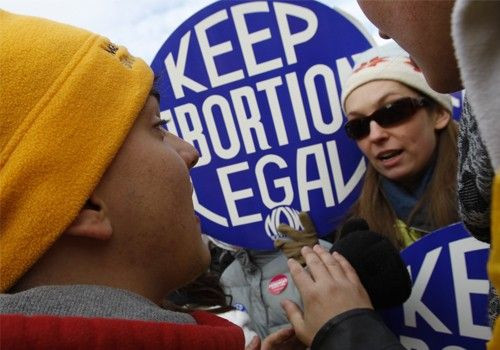Abortion Waiting Periods, Counseling Do Not Sway Women: Study

As state legislatures across the nation continue to propose various restrictions on abortion, usually under the guise that women may otherwise be uninformed or coerced into it, a new study concludes those efforts do not affect women's decisions to follow through with the procedure.
In fact, 87 percent of women planning to get an abortion were highly confident of their decisions before a required counseling session, according to a report published in the June issue of Perspectives on Sexual and Reproductive Health.
Researchers gathered data from pre-counseling needs assessment forms and clinical intake forms of about 5,000 women at one abortion clinic in 2008. Several states have either passed or proposed laws that require waiting periods and counseling sessions before a woman can receive an abortion, a system that the study concluded ultimately does not sway most women's initial decision.
In nearly 9 out of 10 cases, women expressed high confidence in their abortion decision before they received any counseling; these women would likely not benefit from additional mandated counseling or delay, the report states.
However, the author did find that there were certain variables that impeded women's confidence in their decision: being younger than 20, having an African-American background, not having a high school diploma, having a history of depression, knowing the fetus has an anomaly and believing abortion is a crime that will not be forgiven by God.
In contrast, women who had a supportive mother or male partner were more likely to be confident in their decision to follow through with the procedure.
Instead of a state-approved, one-size-fits all policy, the report said that women would likely benefit from interactions with trained staff who can assess and respond to their individual concerns about the issue.
The study was released just as Utah became the first state to enact a 72-hour waiting period for women seeking an abortion. The law, which took effect on Tuesday, expands the state's previous 24-hour waiting period, which supporters claim will give women enough time to truly evaluate their feelings.
Before Utah's statute took effect, South Dakota passed a bill that would have imposed a similar 72-hour waiting period before abortions. A court blocked the measure before it could take effect.
There are currently 35 states that legally require women to receive counseling before having an abortion, while 26 states also impose a 24-hour or longer waiting period, according to the Guttmacher Institute.
In the first three months of 2012 alone, legislators in 45 states introduced 944 provisions related to reproductive health and rights, with many of those laws particularly focused on forcing women seeking an abortion to undergo an ultrasound, limiting access to medical abortion and prohibiting the procedure from taking place after a specific point in the fetus' gestation.
© Copyright IBTimes 2025. All rights reserved.





















